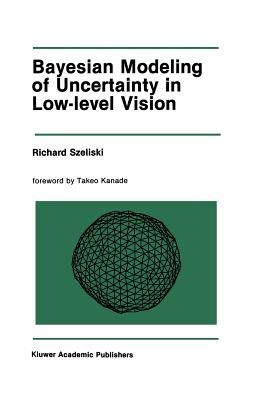
- We will send in 10–14 business days.
- Author: Richard Szeliski
- Publisher: Springer
- ISBN-10: 1461289041
- ISBN-13: 9781461289043
- Format: 15.6 x 23.4 x 1.2 cm, minkšti viršeliai
- Language: English
- SAVE -10% with code: EXTRA
Bayesian Modeling of Uncertainty in Low-Level Vision (e-book) (used book) | bookbook.eu
Reviews
Description
Vision has to deal with uncertainty. The sensors are noisy, the prior knowledge is uncertain or inaccurate, and the problems of recovering scene information from images are often ill-posed or underconstrained. This research monograph, which is based on Richard Szeliski's Ph.D. dissertation at Carnegie Mellon University, presents a Bayesian model for representing and processing uncertainty in low- level vision. Recently, probabilistic models have been proposed and used in vision. Sze- liski's method has a few distinguishing features that make this monograph im- portant and attractive. First, he presents a systematic Bayesian probabilistic estimation framework in which we can define and compute the prior model, the sensor model, and the posterior model. Second, his method represents and computes explicitly not only the best estimates but also the level of uncertainty of those estimates using second order statistics, i.e., the variance and covariance. Third, the algorithms developed are computationally tractable for dense fields, such as depth maps constructed from stereo or range finder data, rather than just sparse data sets. Finally, Szeliski demonstrates successful applications of the method to several real world problems, including the generation of fractal surfaces, motion estimation without correspondence using sparse range data, and incremental depth from motion.
EXTRA 10 % discount with code: EXTRA
The promotion ends in 23d.14:23:24
The discount code is valid when purchasing from 10 €. Discounts do not stack.
- Author: Richard Szeliski
- Publisher: Springer
- ISBN-10: 1461289041
- ISBN-13: 9781461289043
- Format: 15.6 x 23.4 x 1.2 cm, minkšti viršeliai
- Language: English English
Vision has to deal with uncertainty. The sensors are noisy, the prior knowledge is uncertain or inaccurate, and the problems of recovering scene information from images are often ill-posed or underconstrained. This research monograph, which is based on Richard Szeliski's Ph.D. dissertation at Carnegie Mellon University, presents a Bayesian model for representing and processing uncertainty in low- level vision. Recently, probabilistic models have been proposed and used in vision. Sze- liski's method has a few distinguishing features that make this monograph im- portant and attractive. First, he presents a systematic Bayesian probabilistic estimation framework in which we can define and compute the prior model, the sensor model, and the posterior model. Second, his method represents and computes explicitly not only the best estimates but also the level of uncertainty of those estimates using second order statistics, i.e., the variance and covariance. Third, the algorithms developed are computationally tractable for dense fields, such as depth maps constructed from stereo or range finder data, rather than just sparse data sets. Finally, Szeliski demonstrates successful applications of the method to several real world problems, including the generation of fractal surfaces, motion estimation without correspondence using sparse range data, and incremental depth from motion.


Reviews